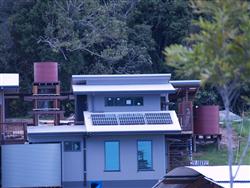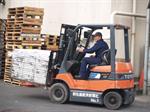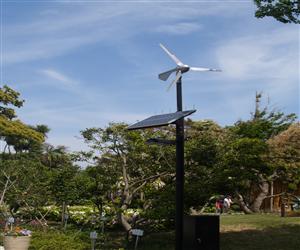Learn about Alternative Energy
- Improve your own sustainability, or work in the Energy industry
- Save time, money (and energy) by studying at home rather than traveling to classes
- Save even more by producing and better managing your own energy needs
- Study at your own pace, where and when you want
- Get great support and any advice you need from our team of academics with experience across both Australia and the UK
Covers the basics of electricity, how to generate electricity from renewable resources, how to store energy, non electrical systems, energy consumption and conservation. Learn to understand why alternative and renewable energy is so important and how to use it.

Course Structure and Content
There are 8 lessons in this course:
- Introduction: The Problems and the Energy Sources.
- Scope and Nature
- Terminology
- Energy consumption through history
- Climate Change
- Energy units
- Problems with Fossil Fuels
- Problems with other energy sources ... hydro electricity, nuclear, wind, solar
- Understanding Energy
- Terminology
- Understanding electricity
- Conductors and non conductors
- Measuring electricity ...current, voltage, resistance
- Ohm's Law
- Circuits ... Series; parallel
- Kirchhoff's law
- Power
- Power ratings
- Magnetism
- Electromagnetism and Solenoids
- Electric motors
- Inductors
 Lenz's law
Lenz's law
- Generating Electricity
- Turbines
- Generators
- Fuel cells
- Wind Power
- Large Scale Wind System Design
- Small Scale Wind System Design
- Solar Energy
- Positioning a solar cell
- Small Scale Solar
- Future Developments in Solar
- Geothermal Energy
- Dry Steam Power Plants
- Flash Steam Power Plants
- Binary Cycle Power Plants
- Advantages of Geothermal
- How Geothermal is used
- Geothermal heat pumps
- Hydropower
- Tide and Current Power
- Tide Barrage
- Tidal Turbines
- Wave Power
- Nuclear Energy
- Fission Reactors
- Fusion
- Half Lives and Radioactivity
- Waste to Energy
- Storage and Using Electricity
- Terminology
- Cells - simple cell, car battery, gel, AGM, Nickel etc
- Deep Cycle Battery
- Lithium Rechargeable Batteries
- Calculating Battery Requirements
- Inverters
- Alternators and Regulators
- Converters
- System Types
- EMR & electricity use
- Recommended Exposure Limits
- Safety with Electricity
 Non-Electric Systems
Non-Electric Systems
- Scope and nature
- Passive Solar
- Fire Wood
- Drying and storing wood
- Comparing different wood types
- Smoke fires
- Creosote formation in fire flues
- Environmental aspects of burning wood
- Bio fuels
- Ethanol
- Small scale Biomass
- Passive Solar Energy
- Solar hot water ... flat plate collectors, evacuated tubes, open or closed circuit, passive or active systems, heat pumps
- Greenhouses
- Night insulation
- Solar Garden Water Features
- Energy Consumption
- Reducing energy consumption
- Pricing
- Population growth
- Large scale reduction of energy consumption - managing green cities, urban sprawl, peak demands, transport, etc.
- Energy Conservation
- How a home owner can reduce energy consumption
- Temperature control
- Minimising light energy consumption
- Minimising appliance energy consumption
- Insulation
- Water conservation
- Solar house design
- Converting to Alternative Systems
- Estimating Energy Needs
- Building Efficiency
- System Design
- System Designers
Course Aims

- Describe the nature and scope of alternative energy.
- Describe the nature and application of electricity.
- Compare different methods of generating electricity
- Compare different techniques for storage and use of electricity.
- Describe the application and operation of different non electric energy systems
- Identify ways to better manage energy consumption.
- Describe energy conservation techniques.
- Discuss how to convert a building’s energy supply to an alternative system.
More than Just Electricity
Much of the energy we choose to use is electricity, largely because of convenience. There are more forms of energy available than electricity. Modern society however has developed itself in a way that depends very heavily on electricity as a "universal currency" of energy. For example, think about a time when the electricity in your home was stopped. This may have been a blackout due to a local storm or because the local council was working on the power lines and had to shit down the grid. Almost always, there is something that you need in that short period that uses electricity. Perhaps you want a cup of tea whilst you wait (you need to boil the kettle), you might pop the television on (which needs electricity), or it may be dark so you no longer have illumination, or you are working on your computer and can no longer do so.
Even a short pause in electricity supply can cause a lot of disruption in our everyday lives. We rely on it heavily. It has become easy to convert other forms of energy into electricity, and then convert it back into another form of energy as, and when we need it.
Here are some examples:
- We burn coal or gas (chemical energy) to create electricity
- We collect solar (light) energy to create electricity
- We collect energy from water running down a river (hydro energy) to create electricity
- We use wind to turn turbines and convert air movement into electrical energy
- We turn electrical energy into heat energy when we use a hot water service, radiator or stove.
- We turn electricity into wind when we use an electric fan.
- We turn electric energy into light when we switch on a light globe.
- We turn electricity into water movement when we use a pump.
Electricity is a convenient form of energy, and given that many appliances have been designed to ONLY operate on electrical energy, and a particular type (e.g. wattage) of electrical energy; it is difficult to avoid using electrical energy and still enjoy the benefits of modern living.
The problem with converting energy into electricity, and then converting it into something else later is that energy conversion is never totally efficient; so each time a conversion is made, a little energy is lost. In an ideal world, we would be collecting energy in the form we wish to use it and using it immediately, without needing to convert it into an "easier to store" form first.

Some Alternatives are More Environmentally Friendly than Others
There are options to using electricity though; and applying at least some can reduce your reliance on electric power.
Other possibilities are only limited by your understanding of science, imagination and innovation.
Passive Solar involves designing a system that optimises or minimises your capture of solar energy, -according to what is required. If you want to catch heat, you can use glass in a position which lets maximum heat into an area from where it can directly be used, while insulating that area to minimise heat loss.
Biogas involves turning organic matter into gas in an enclosed area which can then be extracted and used as fuel. Sewage is sometimes processed through such systems. A Water Wheel or Windmill can be used to directly power a pump or any other moving device (It is not necessary to convert the movement energy into electricity unless perhaps you want to store that energy.
A solar food drier is a construction built to capture heat from the sun to dry food (e.g. dried fruit, some meats, etc). It needs to protect the food from rain or excessive humidity in order to prevent it spoiling.
In humid areas, design that facilitates natural ventilation can reduce humidity and heat build up; in turn reducing the need for air conditioning. eg. using forced air flow through a system, particularly a larger facility (e.g. you may be able to design a wind or water wheel powered fan).